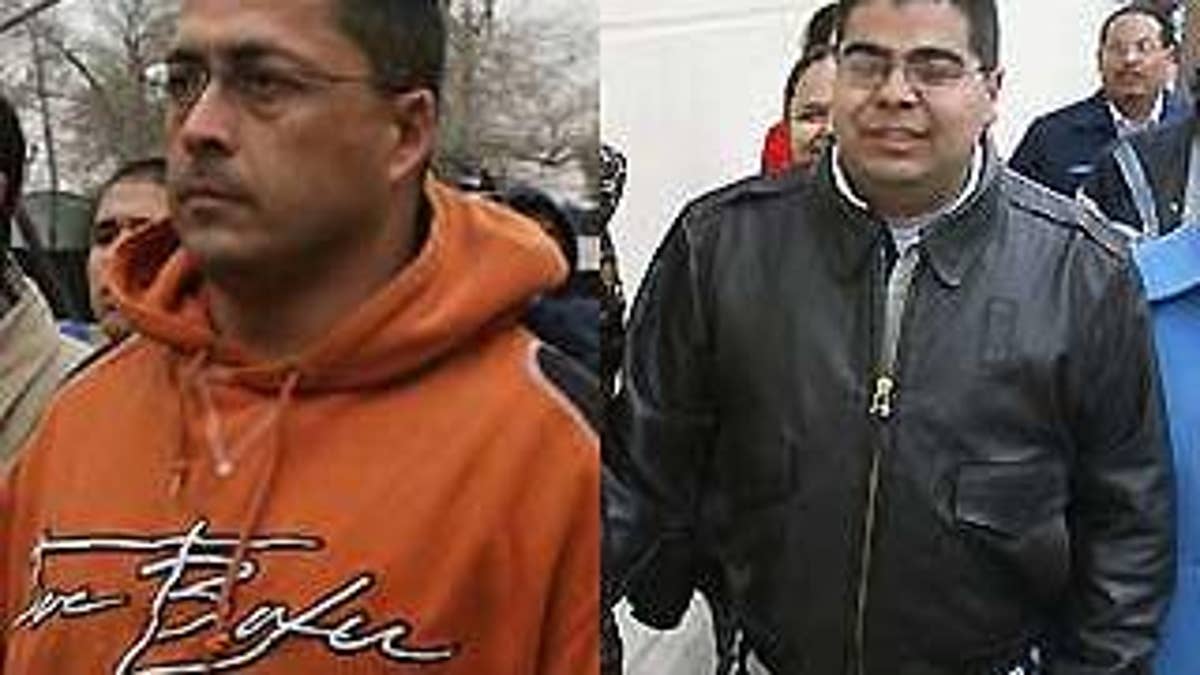
On his last full day in office, President Bush commuted the controversial sentences of two former Border Patrol agents convicted of shooting a Mexican drug runner in 2005.
The imprisonment of Ignacio Ramos and Jose Alonso Compean had sparked outcry from critics who said the men were just doing their jobs and were punished too harshly. They had been sentenced to 11- and 12-year sentences, respectively.
Their sentences will now expire on March 20 of this year.
Ramos and Compean were sentenced in connection with the shooting of Osvaldo Aldrete Davila, who was shot in the buttocks while trying to flee along the Texas border. He admitted smuggling several hundred pounds of marijuana on the day he was shot and pleaded guilty last year to drug charges related to two other smuggling attempts.
The pair's case ignited debate across the country, as a chorus of organizations and members of Congress -- many of them Republican -- argued that the men were just doing their jobs. Rep. Dana Rohrabacher, R-Calif., was particularly outspoken on the issue, at one time describing Ramos and Compean as "unjustly convicted men who never should have been prosecuted in the first place."
Rohrabacher applauded Bush on Monday, telling FOXNews.com "his own stubbornness was overcome by better parts of his own soul."
"The order ... reaffirms our faith that the system works, if indeed the American people are willing to work at it," he said.
Nearly the entire congressional delegation from Texas and other lawmakers from both sides of the political aisle pleaded with Bush to grant them clemency. Conservatives hailed Bush's decision Monday.
"The whole thing was ridiculous from beginning to end, and two years was way too long for them to serve," said radio talk show host Laura Ingraham. "Conservatives are very happy across the country."
Rep. Steve King, R-Iowa, said in a written statement that Bush had "responded to the calls for compassion that came from across the country and made the right decision in granting these two men commutations."
The border agents argued during their trials that they believed Davila was armed and that they shot him in self defense. The prosecutor in the case said there was no evidence linking the smuggler to the van that contained the marijuana. The prosecutor also said the border agents didn't report the shooting and tampered with evidence by picking up several spent shell casings.
The agents were fired after their convictions on several charges, including assault with a dangerous weapon and with serious bodily injury, violation of civil rights and obstruction of justice. All their convictions, except obstruction of justice, were upheld on appeal.
Bush has been cautious in his use of pardon powers, and particularly careful when it comes to commutations of prison terms. A pardon is an official forgiveness of a crime (typically requested at least five years after the completion of a prison term); a commutation is a reduction of sentence.
Before Monday, Bush had granted 189 pardons and nine commutations. By comparison, President Clinton granted 396 pardons and 61 commutations, many on his last day in office. President Reagan granted 393 pardons and 13 commutations.
The White House has until noon Tuesday, when President-elect Barack Obama is to be sworn in, to grant any more clemency requests. But White House Press Secretary Dana Perino said Monday's commutations would be Bush's last acts of clemency.
A number of high-profile criminals had been requesting clemency from Bush for months.
Randall "Duke" Cunningham, a former Republican congressman from California, was among those seeking a commutation. Cunningham pleaded guilty to conspiracy and other charges for accepting $2.4 million in bribes in exchange for steering defense contracts to conspirators. He was sentenced to eight years in prison in 2006.
Former Democratic Louisiana Gov. Edwin Edwards, who was convicted in 2000 on racketeering charges and later sentenced to 10 years in prison, was also appealing to the president for a reduction of sentence.
Former Republican Gov. George Ryan of Illinois was doing the same. Though he's served only one year of his 6 1/2-year sentence -- he was convicted on racketeering charges in connection with a host of schemes, including steering contracts to lobbyists and covering up bribes paid in return for truck drivers' licenses -- he earned the support of figures like Illinois Sen. Dick Durbin, a Democrat who recently sent a letter to Bush asking for Ryan's release.
More than 2,100 clemency petitions were pending before the president. John Walker Lindh, the American who pleaded guilty to aiding the Taliban in 2002 and was sentenced to 20 years in prison, had a commutation request before the president. Lindh's parents had appealed to the president for their son's release, saying he made a "mistake."
Media mogul Conrad Black, who was convicted of fraud, was also seeking commutation, and former junk bond salesman Michael Milken, convicted of securities fraud, had requested a pardon.
Justin Volpe, the former New York City police officer sentenced to 30 years in prison for sodomizing and assaulting a Haitian immigrant in police custody in 1997, had requested a commutation.
One of the most significant clemency decisions by Bush so far was the call earlier in his second term to commute the 30-month prison sentence of I. Lewis "Scooter" Libby, Vice President Dick Cheney's former chief of staff, who was convicted of perjury and obstructing justice in connection with the 2003 leak of then-CIA operative Valerie Plame's identity.
Libby was left with two years' probation and a $250,000 fine; he did not request a full pardon.
Alaska Sen. Ted Stevens, the Republican senior senator who was convicted on corruption charges in October, also will apparently not receive clemency.
FOX News' Mike Levin and The Associated Press contributed to this report.




